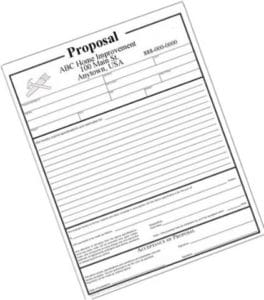Q: Hi. We received an estimate from a roofing contractor for $10,500. When the job was done, he gave us a bill for over $11,000. He said that the roof took an additional square of shingles and required some repairs to the sheathing. It was our belief that the original “estimate” was the full cost of the job, not just a best guess at the cost. Who is right here? – Alex
A: Unfortunately, the term “estimate” is used both ways, leading to a lot of confusion over its meaning. Sometimes an estimate is a binding contract with a fixed price for the work; other times it is literally an “estimate” of what the contractor thinks the job might cost. In other words, it is really a “guesstimate,” subject to revision at the end of the job.
Fixe d-Price Bids
d-Price Bids
If the “estimate” is presented in writing as the cost of the job, with a description of the work, and signed by both you and the contractor it is a binding contract with a fixed-price bid. There may be language in the contract that allows the contractor to modify the price for specific reasons, such as hidden conditions. For example, it may say “Additional charges may be added for necessary repairs to the roof structure” or something similar. But otherwise, the cost is fixed.
In a formal contract, ant additional work would be priced with a change order before the work is done. It’s best if the hourly rate for extra work is included in the original contract, along with allowances for any variable cost items, like kitchen cabinets.
However, on small jobs the added cost is often just added to the bill at the end of the job. The best practice is for the contractor to inform the owner of the extra work and extra cost before the work is started. This eliminates unpleasant surprises, and possible disputes, at the end of the job.
Approximate Cost
In other cases, the estimate is just what it sounds like, an approximate guess like an estimate of your weight (often low than the reality) or the length of a fish (often higher). Unfortunately, construction often costs more than the original estimate, and rarely costs less.
A cost-plus bid is a common instance of an estimate” that is just a best guess of what the job will cost. The final cost will be determined by the actual costs of time and materials used on the job. More experienced contractors are more likely to provide more accurate estimates as they’ve been around the block a few times, and accurate estimating is the heart of any consecution business.
Still, it’s human nature that these best guesses are often optimistic, and assume that everything will go smoothly, which is rarely the case on construction jobs. Also, the contractor has a strong incentive to give an attractive low estimate to the owner, who is more likely to agree to a lower price. Owners are also optimistic at the beginning of a job and often have an unrealistic idea of what a job will cost.
In a fixed-price contract, the contractor assumes the risk of estimating errors. On a cost-plus job, the risk is assumed by the owner. In some contracts, the risk is shared by limiting cost overruns with a “not to exceed” price.
Fixed Bid or Best Guess?
If you’re not sure whether an estimate is a fixed-bid or a best guess, then by all means ask for clarification. If it is a fixed bid, get it in writing in the form of a written contract, even if it’s just a one-page proposal with a price and brief description of the work to be completed (scope of work). A verbal contract is legally valid in construction, but impossible to prove – so make sure you get it in writing!
If the estimated cost provided by the contractor is just a best guess, then get a clear description of how the price will be determined. Most likely, the pricing will be based on time and materials, plus a markup. Again, it’s best to get this in writing, in the form of a cost-plus contract. Clarify whether the labor includes travel time, permitting, and other extra costs.
At a minimum, get the estimate broken down to labor and materials, including the hours and size of the crew. Hint: the most efficient crew for most small jobs is a crew of one! No one standing around with his hands in his pocket.
When Job Costs Less Than the Estimate
We recently had a gas line run for a gas fireplace. The work was done by the regional gas company, based on a written estimate of over $1,000 for a crew of two for four hours. Just to be clear, we contacted the gas company and learned that the estimate was not a fixed price, but that they rarely went over their estimates.
The work took under two hours. Because we were nearby, no travel time was added. The final cost came in about $300 less than the estimate, a pleasant surprise.
A private contractor had given us a fixed bid of $1,200 for the same work. So we made out by accepting the risk of a time-and-materials contract. In this case, we trusted that the gas company knew how long these jobs usually take and trusted that they would do a good job.
I never recommend cost-plus contracts for large jobs. There’s too much risk of large cost overruns. But on small jobs like this, an approximate “estimate” can be acceptable as long as you trust the contractor’s estimating skills and integrity. The estimate will probably be close to the final cost. Still, a job coming in for less than the the is a very rare event in the building world! — Steve Bliss, BuildingAdvisor.com
Leave a Reply